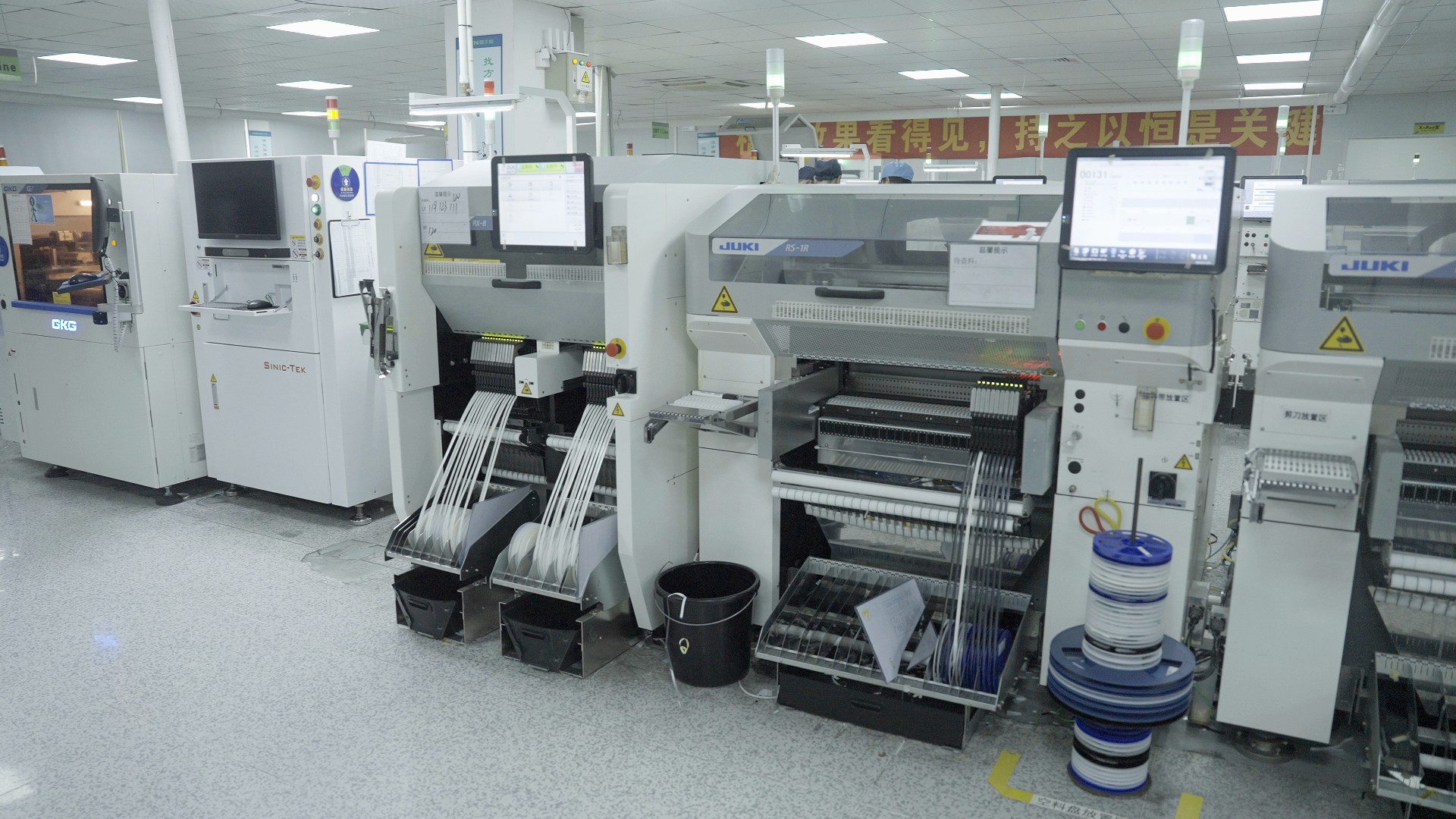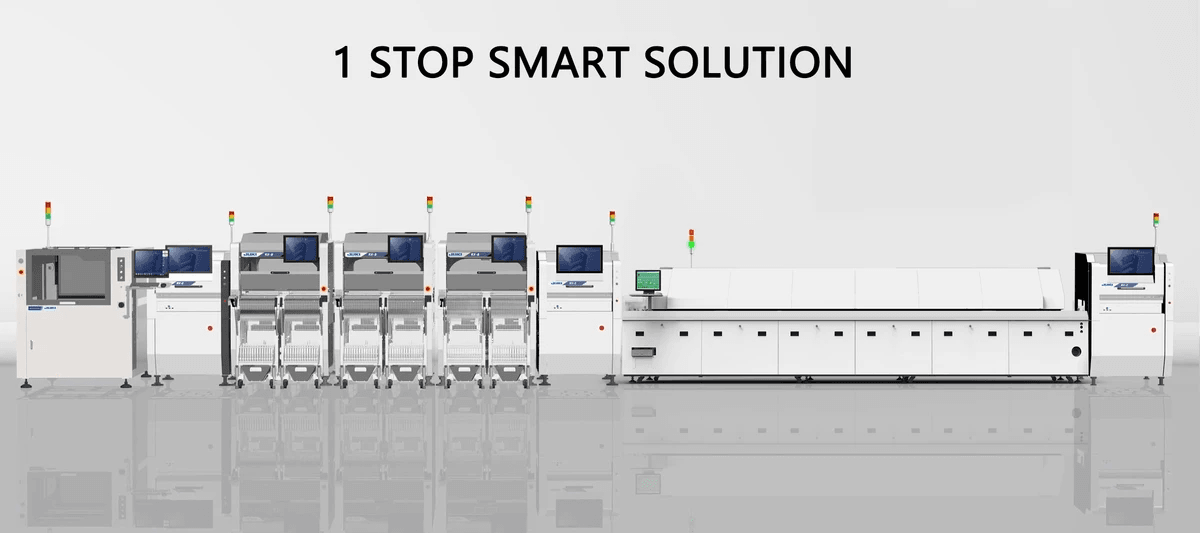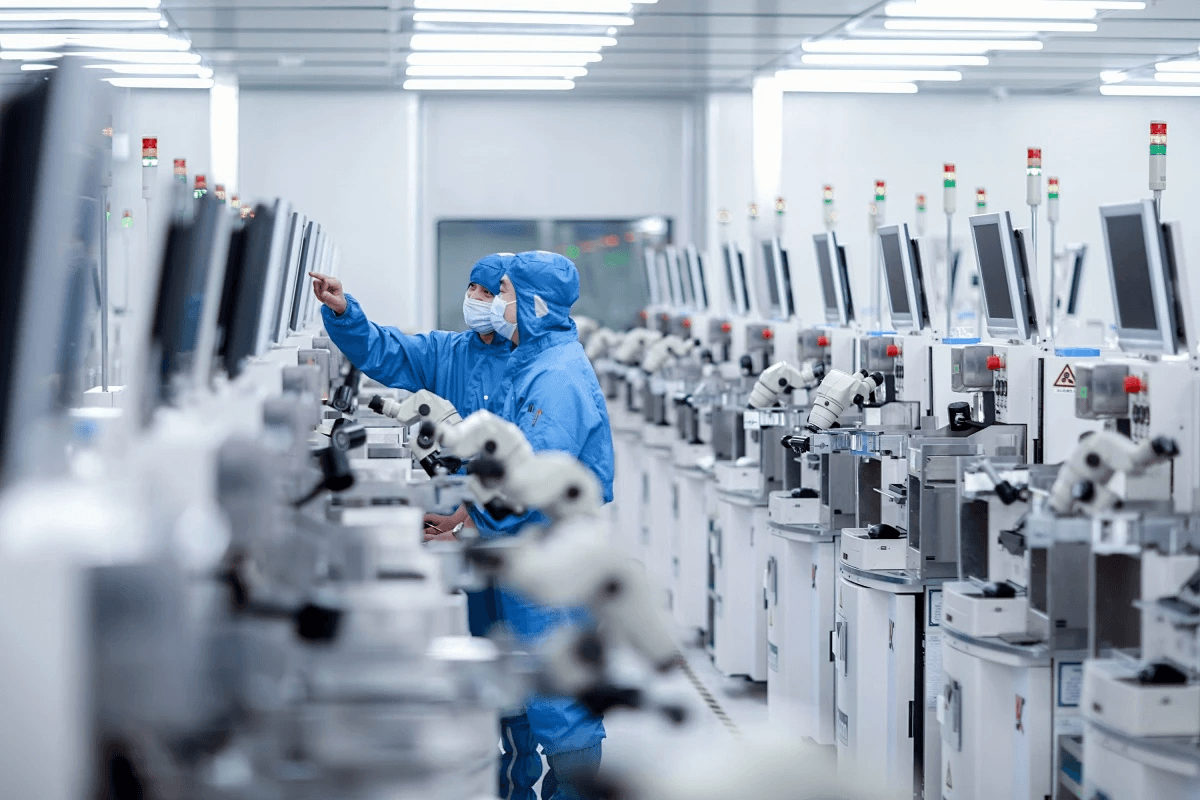Introduction

In the fast-paced world of electronics, the SMT production line stands out as a critical component in modern PCB assembly and manufacturing. This sophisticated process not only streamlines the production of printed circuit boards (PCBs) but also enhances overall efficiency, making it essential for businesses looking to stay competitive. By understanding the intricacies of surface mount technology (SMT), manufacturers can unlock significant benefits that drive innovation and productivity.
Understanding the SMT Production Line
The SMT production line is a carefully orchestrated sequence of processes designed for efficient PCB production and assembly. It encompasses various stages, including solder paste application, component placement, reflow soldering, and inspection, all aimed at achieving high-quality results with minimal waste. Each element in this line plays a vital role in ensuring that PCBs are manufactured to meet rigorous industry standards.
The Role of PCB Assembly
PCB assembly serves as the backbone of electronic device manufacturing, transforming raw materials into functional circuits that power our everyday gadgets. The process involves placing components onto PCBs in precise configurations to ensure optimal performance and reliability. With advancements in SMT technology, PCB assembly has evolved to accommodate increasingly complex designs while maintaining cost-effectiveness and speed.
Benefits of Surface Mount Technology
Surface mount technology offers numerous advantages over traditional through-hole methods in PCB production and assembly. For starters, it allows for smaller component sizes and higher density placements on PCBs, which leads to more compact designs without sacrificing functionality. Additionally, SMT significantly reduces production time due to its automated processes facilitated by advanced smt machines—resulting in faster turnaround times for manufacturers eager to meet market demands.
What is an SMT Production Line?

An SMT production line is a sophisticated assembly system designed for the efficient manufacturing of printed circuit boards (PCBs) using surface mount technology. This process involves placing electronic components directly onto the surface of the PCB, which streamlines both the PCB assembly and manufacturing phases. By integrating various machines and technologies, the SMT production line enhances productivity and quality in PCB production and assembly.
Components of the SMT Process
The components of the SMT process are essential for achieving high-quality PCB assembly. Key elements include solder paste printers, pick-and-place machines, reflow ovens, and inspection systems. Each component plays a critical role in ensuring that electronic parts are accurately placed on PCBs and that connections are securely made during PCB manufacturing.
Solder paste printers apply a precise amount of solder paste to designated areas on the PCB, which is crucial for strong electrical connections. The pick-and-place machine then carefully positions components onto these soldered pads with remarkable speed and accuracy. Finally, reflow ovens heat up to melt the solder paste, creating permanent bonds between components and the board—completing the intricate dance of PCB production and assembly.
The Workflow of PCB Manufacturing
The workflow of PCB manufacturing within an SMT production line follows a systematic approach that maximizes efficiency at every stage. Initially, design files are prepared based on specific requirements for each project; this ensures that all components align with intended functionalities during assembly. Once designs are finalized, materials such as PCBs and electronic components are procured to kick off the manufacturing process.
After preparation, each board undergoes solder paste application followed by component placement using advanced smt machines that ensure precision placement across all types of surface mount devices (SMDs). Post-assembly processes involve reflow soldering to solidify connections before moving onto rigorous quality control checks to identify any defects or inconsistencies in each assembled unit. This structured workflow not only guarantees high-quality outcomes but also significantly reduces lead times in pcb production and assembly.
Key Technologies in SMT
Key technologies in SMT have revolutionized how we approach pcb manufacturing by introducing automation into every step of the process. One notable technology is automated optical inspection (AOI), which allows manufacturers to detect errors or misalignments quickly after placements have been made—saving time during quality assurance stages. Additionally, advancements such as laser soldering techniques provide enhanced precision when working with delicate electronic components.
Another game-changer has been Industry 4.0 integration into SMT lines; this enables real-time monitoring through IoT devices that track machine performance metrics and product quality data continuously throughout production runs. Such innovations not only improve operational efficiency but also facilitate proactive maintenance strategies that help avoid costly downtimes in pcb assembly operations. As these technologies continue evolving, they promise even greater improvements for future pcb production lines.
Enhancing Efficiency in PCB Assembly

In the fast-paced world of electronics, enhancing efficiency in PCB assembly is crucial for staying competitive. The integration of advanced techniques and technologies into the SMT production line has revolutionized how we approach PCB manufacturing. By streamlining processes, reducing production time, and implementing stringent quality control measures, manufacturers can significantly enhance their output while maintaining high standards.
Streamlined Processes in Manufacturing
Streamlined processes are at the heart of efficient PCB assembly and manufacturing. By adopting lean manufacturing principles within the SMT production line, companies can eliminate waste and optimize workflow, allowing for smoother transitions between stages of production. This not only speeds up the overall process but also enhances collaboration among teams involved in PCB production and assembly.
Utilizing modern SMT machines further contributes to streamlined operations by automating repetitive tasks such as component placement and soldering. With precise machinery handling these functions, human error is reduced significantly, leading to a more reliable assembly process. Moreover, an organized layout of the SMT production line minimizes unnecessary movements and maximizes productivity.
Reducing Production Time with SMT
One of the standout benefits of surface mount technology (SMT) is its ability to drastically reduce production time for PCB assembly. The compact nature of surface mount components allows for higher density layouts on PCBs, which means more components can be placed on a single board without sacrificing performance or reliability. As a result, manufacturers can produce more units in less time while ensuring that each piece meets rigorous quality standards.
Additionally, automated processes within an SMT production line allow for rapid changes between different product runs without significant downtime. This flexibility is essential in today’s market where demand can shift quickly based on consumer preferences or technological advancements. Consequently, reducing production time not only boosts output but also allows companies to respond swiftly to market changes.
Quality Control in PCB Production
Quality control remains a top priority throughout the entire PCB manufacturing process—especially when it comes to surface mount technology (SMT). Implementing rigorous testing protocols at various stages ensures that any defects are caught early before they escalate into larger issues during final assembly or product deployment. Advanced inspection systems integrated into the SMT production line help identify misaligned components or soldering defects with remarkable accuracy.
Moreover, continuous monitoring during the pcb assembly process helps maintain high standards by providing real-time feedback on potential problems that could affect overall quality. This proactive approach allows manufacturers to make necessary adjustments promptly rather than waiting until later stages when defects may be harder to rectify. Ultimately, investing in robust quality control mechanisms leads to superior products that enhance customer satisfaction and loyalty.
The Importance of SMT Machines

In the realm of PCB assembly, SMT machines play a pivotal role in streamlining production and enhancing efficiency. These machines are designed to handle various tasks within the SMT production line, from placing components on PCBs to soldering them in place. Understanding the types of SMT machines available is crucial for any manufacturer looking to optimize their PCB manufacturing process.
Types of SMT Machines Used
The landscape of SMT machines is diverse, with several types tailored for specific functions in PCB production and assembly. Placement machines are perhaps the most critical, as they accurately position surface mount components onto PCBs at high speeds. Other essential machines include solder paste printers, reflow ovens, and inspection systems, all working together to ensure quality and precision in the PCB manufacturing process.
Each type of SMT machine contributes uniquely to the overall efficiency of the SMT production line. For instance, solder paste printers apply adhesive substances that hold components in place before soldering occurs. Meanwhile, inspection systems help catch any defects early on, ensuring that only top-notch PCBs make it through to final assembly.
Innovations in Surface Mount Technology
Innovation drives progress in surface mount technology (SMT), leading to enhanced capabilities and improved performance across PCB assembly processes. Recent advancements include more sophisticated placement algorithms that increase accuracy while reducing cycle times during PCB manufacturing. Additionally, new materials and techniques have emerged that improve solder joint reliability and reduce thermal stress on components.
Another exciting development is the integration of AI-driven analytics into SMT machines, allowing manufacturers to predict maintenance needs and optimize workflows dynamically. This not only enhances productivity but also significantly reduces downtime associated with manual checks or repairs during PCB production and assembly processes. With these innovations at hand, companies can stay ahead in a competitive market while producing high-quality products.
The Impact of Automation on PCB Assembly
Automation has revolutionized the way we approach PCB manufacturing and assembly within an SMT production line context. By automating repetitive tasks such as component placement or soldering processes with advanced SMT machines, manufacturers can achieve unprecedented levels of speed and accuracy—far beyond what manual labor could offer alone. This shift not only increases output but also minimizes human error during critical phases of production.
Moreover, automated systems allow for real-time monitoring and adjustments based on data collected throughout the manufacturing process. This capability ensures that any inconsistencies are addressed immediately rather than discovered later down the line when they could be more costly to rectify during final inspections or customer feedback cycles—ultimately leading to higher quality assurance in your PCBA outcomes.
In conclusion, understanding the importance of various types of SMT machines along with their innovative features is essential for optimizing your PCB assembly operations today—and tomorrow! Embracing automation within your smt production line will undoubtedly give you a competitive edge while future-proofing your business against industry shifts.
Bensun Technology: Your SMT Partner

In the world of PCB assembly and manufacturing, finding the right partner can make all the difference. Bensun Technology stands out as a leader in providing comprehensive solutions tailored to meet your unique needs. With a focus on enhancing efficiency and quality in your SMT production line, Bensun is equipped to support your PCB production and assembly goals.
Comprehensive Solutions for Your Needs
Bensun Technology offers an extensive range of services designed specifically for the PCB manufacturing industry. From initial design consultations to final assembly, their comprehensive solutions ensure that every step of the PCB assembly process is optimized for success. By integrating advanced technologies into their SMT machines, they deliver high-quality results that exceed industry standards.
Moreover, Bensun understands that each client has distinct requirements; therefore, they customize their offerings to fit various project scales and complexities. Whether you need small-batch runs or large-scale production, their flexibility allows for seamless adaptation to your needs. This commitment to tailored solutions makes them an invaluable partner in your PCB production and assembly journey.
Flexibility in Production and Leasing
One of the standout features of Bensun Technology is its flexibility in both production methods and leasing options for SMT machines. Clients can choose from various leasing arrangements that allow them to access cutting-edge equipment without the burden of outright purchase costs. This flexibility helps businesses manage cash flow effectively while still benefiting from state-of-the-art surface mount technology.
Additionally, Bensun's adaptable manufacturing processes enable clients to scale operations quickly based on demand fluctuations. Whether you're ramping up for a new product launch or scaling back during slower periods, they have you covered with efficient solutions tailored to your specific needs. Their ability to pivot ensures that you maintain a competitive edge in an ever-evolving market landscape.
High-Quality PCBA Manufacturing Services
Their rigorous quality control measures guarantee that every component produced meets stringent standards before it reaches clients' hands. By employing advanced inspection techniques throughout the SMT production line, they minimize defects and ensure reliability in every PCBA manufactured.
Furthermore, with a team of seasoned professionals overseeing each stage of production, clients can trust that their projects are in capable hands. The combination of expertise and innovative technology results in high-quality PCBA manufacturing services that stand out from competitors'. When partnering with Bensun Technology, you’re not just getting a service provider; you're gaining a trusted ally committed to delivering excellence every time.
Real-World Examples of Efficiency Gains

In the competitive landscape of electronics manufacturing, the implementation of SMT production lines has proven to be a game changer. Companies that have embraced advanced PCB assembly techniques are reaping significant benefits in terms of efficiency and output. By analyzing real-world case studies, we can glean valuable insights into how these innovations are reshaping the PCB manufacturing industry.
Case Studies of Successful Implementations
One standout example is a leading automotive electronics manufacturer that integrated an automated SMT production line into its operations. By utilizing high-speed SMT machines, they reduced their PCB assembly time by 40%, allowing them to meet increasing demand without sacrificing quality. Another notable case involved a consumer electronics company that adopted surface mount technology for their new product line, achieving a 30% decrease in production costs while enhancing product reliability.
These successful implementations highlight the transformative power of modern PCB and assembly methods. Companies leveraging advanced technologies not only streamline their processes but also gain a competitive edge in the market. The results speak volumes—faster turnaround times and improved profit margins are just some of the rewards waiting for those who invest in effective SMT solutions.
Lessons Learned from the Industry
From these case studies, several key lessons emerge about optimizing PCB production and assembly processes. First and foremost, investing in state-of-the-art SMT machines is crucial; outdated equipment can bottleneck productivity and increase error rates during manufacturing. Additionally, training staff on best practices for handling surface mount components ensures that quality control remains paramount throughout the PCB assembly process.
Another lesson is the importance of flexibility within an SMT production line; companies that can easily adapt to changing demands or product variations tend to thrive in volatile markets. Collaboration with suppliers who understand PCB manufacturing intricacies also plays a vital role in maintaining efficiency and minimizing downtime during production runs. Ultimately, embracing change and innovation is essential for staying ahead in this fast-paced industry.
Future Trends in SMT Production Lines
Looking ahead, several trends are set to shape the future of SMT production lines significantly. One such trend is increased automation; as technology advances, more manufacturers will adopt fully automated systems for both PCB assembly and manufacturing processes. This shift promises not only higher efficiency but also greater consistency across all products produced on these lines.
Additionally, sustainability will play an increasingly important role as companies seek eco-friendly materials and processes within their PCB production and assembly operations. Innovations such as smart factories equipped with IoT devices will enable real-time monitoring and adjustments to optimize workflows further while minimizing waste. Ultimately, staying attuned to these emerging trends will be essential for any organization looking to maintain relevance in an ever-evolving market landscape.
Conclusion
In the rapidly evolving world of electronics, embracing automation in PCB manufacturing is no longer just a choice—it's a necessity. The integration of advanced SMT production lines streamlines the entire PCB assembly process, enhancing efficiency and reducing errors. As companies strive to meet consumer demands, automating processes ensures they remain competitive and responsive.
Embracing Automation in PCB Manufacturing
Automation in PCB assembly is revolutionizing how manufacturers operate, allowing for faster turnaround times and improved productivity. With state-of-the-art SMT machines, tasks that once took hours can now be completed in minutes, significantly cutting down on labor costs and human error. This shift not only boosts output but also enhances the overall quality of the PCB production and assembly process.
The Competitive Edge of SMT Technology
Surface mount technology (SMT) provides a distinct advantage over traditional methods by enabling higher component density on PCBs while maintaining reliability. This competitive edge allows manufacturers to produce smaller, lighter devices without sacrificing performance—a crucial factor in today’s tech-driven market. As more companies adopt SMT production lines, those who lag behind risk being outpaced by competitors who leverage this innovative technology.
Future-Proofing Your Production Line
To future-proof your PCB manufacturing operations, investing in flexible and scalable SMT solutions is vital. Modern smt machines are designed to adapt to new technologies and changing market demands, ensuring longevity and relevance in an ever-shifting landscape. By prioritizing smart investments now, businesses can safeguard their operations against obsolescence while continuously improving their production capabilities.
